-
CENTRES
Progammes & Centres
Location
With prospects of convergence of strategic interests prompted by geopolitical calculations being overshadowed by divergences in social, cultural and political values — US-China were bound to decouple when their contemplations faltered away.

This article is part of the series America on the Ballot.
In 2019, US and China celebrated their 40th anniversary of diplomatic relationship, since the culmination of President Richard Nixon’s visit to China in 1972 which led to the US recognising China on 1 January 1979. The rapprochement between the two countries was preceded by ‘opening and reform’ — initiated by Deng Xiaoping in December 1978. ‘Getting rich 富起来’ while avoiding confrontation with superpower United States and at the same time learning, collaborating and adopting from Washington was Deng’s mantra.
Since then, US-China cooperation has literally encompassed all sectors, except the military. Chinese universities established intensive collaborations with American universities, sponsoring students to study in the States, faculties jointly working in laboratories and publishing papers, in social sciences, sciences and even arts. American businesses operating in China, brought investment and technological knowhow and in-turn benefited from the growing Chinese market.
Thereafter, while visiting the US in 2013, Xi Jinping defined “New Type of Great Power Relations” in his meeting with Obama at Sunnylands as a) no conflict or confrontation, through emphasising dialogue and treating each other’s strategic intentions objectively; b) mutual respect, including for each other’s core interests and major concerns; and c) mutually beneficial cooperation, by abandoning the zero-sum game mentality and advancing areas of mutual interest. By proposing this new type of great power relationship between US and China, Beijing was trying to elevate its position to be treated as an equal, at-par with the existing hegemon i.e. the US.
"China’s Belt and Road Initiative (一带一路) initiated in 2013, was believed as building a new world order averse to the existing order and challenging the hegemony of the US."
However, American academia and even policy makers avoided the term in referring to the bilateral relationship, as it would be tantamount to accepting the US as a declining power and it taking a backseat in the bilateral relationship. This meant, a systematic denial of the status, that China was seeking. Francis Fukuyama argued that states seek universal recognition, and China which had blamed the ‘century of humiliation’ behind its belated rise, soon believed that its time had come in the world politics. This was evident when Xi Jinping, General Secretary of Communist Party of China, while presenting the report to the 19th Party Congress, emphasised that China has become stronger (强起来了), indicated that Beijing will not accept anything but equality with the other great powers. In addition, China’s Belt and Road Initiative (一带一路) initiated in 2013, was believed as building a new world order averse to the existing order and challenging the hegemony of the US. Hence, pushing the US and China in a proverbial Thucydides trap.
Nevertheless, the United States under Barak Obama administration gave cold shoulder to the rising aspiration of China and launched its own Rebalance to Asia and Pacific Strategy “to preserve and enhance a stable and diversified security order in which countries pursue their national objectives peacefully and in accordance with international law and shared norms and principles, including: the peaceful resolution of disputes; an open economic order that promotes strong, sustainable, balanced and inclusive growth through a level, competitive playing field; and a liberal political order that promotes peace and human dignity, based on human rights and the rule of law” (sic).
Despite limited successes of engagement under Obama yielding progress on global governance matters of mutual interest, both China and the US could not but begin ditching the ‘superficial friendship’ in their strategic considerations to consolidate the ‘foe’ element in their ties. The strengthening of this ‘foe’ factor in their relationship was only accelerated by Donald Trump, for both domestic considerations — where hyper-globalisation began to be subdued for hyper-nationalism, and to preserve domination of the US in world politics.
"The first two confrontations and competitions in economy and technology/security domain clearly hints the decline of the US and refusal to cave in."
The deterioration in US-China relationship was exacerbated by Trump’s trade war, contentions over China’s 5G propositions, and either side’s ‘wolf warrior’ and ‘captain America’ diplomacy. The first two confrontations and competitions in economy and technology/security domain clearly hints the decline of the US and refusal to cave in. Hence, Chinese scholars like Wang Wen put the blame on the US for deterioration in the relationship. He argues that Americans think that China will replace the United States in global politics and the risk of being replaced by China is more than that of the Soviet Union. This fear is exacerbated by the rise of China’s national power, technology and ideas, and thoughts. Hence, he predicts that Sino-US relations will be tense with frequent clashes, which will become a new normal. Whereas, Jin Canrong expresses similar thoughts that competition is the basic trend in US-China bilateral relations, but he believes that it’s possible to avoid the new cold war.
However, China’s Wolf warrior diplomacy indicates ascendency of a more confident China — but also one that is in haste.Primarily, the image building and manoeuvring by Beijing and to tell the China’s story has backfired. Chinese academia and policy makers advise officials to restrain and enlarge the group of storytellers. For instance, Fu Ying, former Vice Minister of Foreign Affairs of China suggests to shape global narratives for telling China’s stories as the world’s perception of China can be shaped by Chinese narratives and behaviours, but at the same time warns that only officials and diplomatic stories are not sufficient to convince the diverse global audiences. Shi Yinhong remarked at a conference “World Order and Chinese Diplomacy in the context of Covid-19” at Remmin University that declaring victory of Chinese model in defeating Covid-19 is too soon and too loud. Hence some Chinese scholars suggest that Chinese people should see China’s rise with a ‘modest and prudent’ — rather than a ‘self-righteous’ attitude.
"Some Chinese media too report positively of the US. In other words, China must not criticise the US in one voice but have different opinions."
Some also view the current US-China hostility as being created by the Republican media and hawks in the America for domestic consumption as the Democratic party has been restrained so far. Hence, some Chinese media too report positively of the US. In other words, China must not criticise the US in one voice but have different opinions.
In addition, relations have strained as antagonism in US-China relations is not one sided, but both Washington and Beijing have gradually woken up to fact that they can’t alter the other’s intrinsic values. The US is disappointed that China has still not adopted a democratic system and rule of law to fit better with the notions of the US-led liberal world order, despite favourable US policies that have integrated China into the existing international order. Beijing on the other hand, has expected that integration in the existing system and deepening of ties with Washington will help erode international misperceptions around its own socialist system of governance, nevertheless with some requisite changes which suit China’s interests.
As the world enters into supposed new Cold War, as many scholars believe, US-China rivalry will have much wider implications rather than remaining confined to its bilateral realm. Plus, this new Cold War has its own unique characteristics. Ideological fever is not at commanding heights but some US officials have dubbed this as a ‘clash of culture’, between Western and Chinese values. Ironically however, this is neither a clash of culture nor a contest of systems of government, but mostly a geopolitical competition that drives Washington and Beijing to compete with each other. As a result, scholars like Yan Xuetong for instance, view 2019 as a watershed year in the beginning of the bipolar system. Led by US and China, this emerging order stands distinguished by the pressures of the digital age and its characteristics, and thus lends new features to the world order. Yan Xuetong, unlike Beijing’s emphasis on win-win cooperation or a new type of great power relations, believes the zero-sum nature of great power competition remains unchanged with win-win situations being elusive.
"Led by US and China, this emerging order stands distinguished by the pressures of the digital age and its characteristics, and thus lends new features to the world order."
Moreover, such features of this cold war that are opaque, have also left geopolitics and states perplexed for the time being. But with intensifying rivalry between the US and China and no third block emerging in the foreseeable future, Cold War 2.0 may push individual states to hedge between the two, rather than non-aligning. Having said that, there is scope for easing of tensions. Chinese scholars and policy makers like Zheng Yongnian and Long Yongtu are of the opinion that deteriorating US-China ties are making some states increasingly hostile towards Beijing, namely Australia, UK, India and some Southeast Asian states for their own regional calculations and interests. Hence, Long suggests that investing-in and normalising relations with the United States could help in reducing the assertiveness of such countries towards Beijing. In fact, this is a widely held belief amongst China’s strategic community.
In a nutshell, with prospects of convergence of strategic interests prompted by geopolitical calculations being overshadowed by divergences in social, cultural and political values, US-China were bound to decouple when their contemplations faltered away. The diminishing US-China engagements, has no doubt cast a long shadow on regional and global security order. The coming world order, in the absence of just one superpower, may pave the way for a new security and political order altogether, or a radical reform in the existing architecture — thereby increasing the stakes of middle powers in the new arrangement.
The views expressed above belong to the author(s). ORF research and analyses now available on Telegram! Click here to access our curated content — blogs, longforms and interviews.

Dr. Rajiv Ranjan is Assistant Professor College of Liberal Arts Shanghai University Shanghai PRC. He was one of the panellists at the event Combatting Coronavirus ...
Read More +